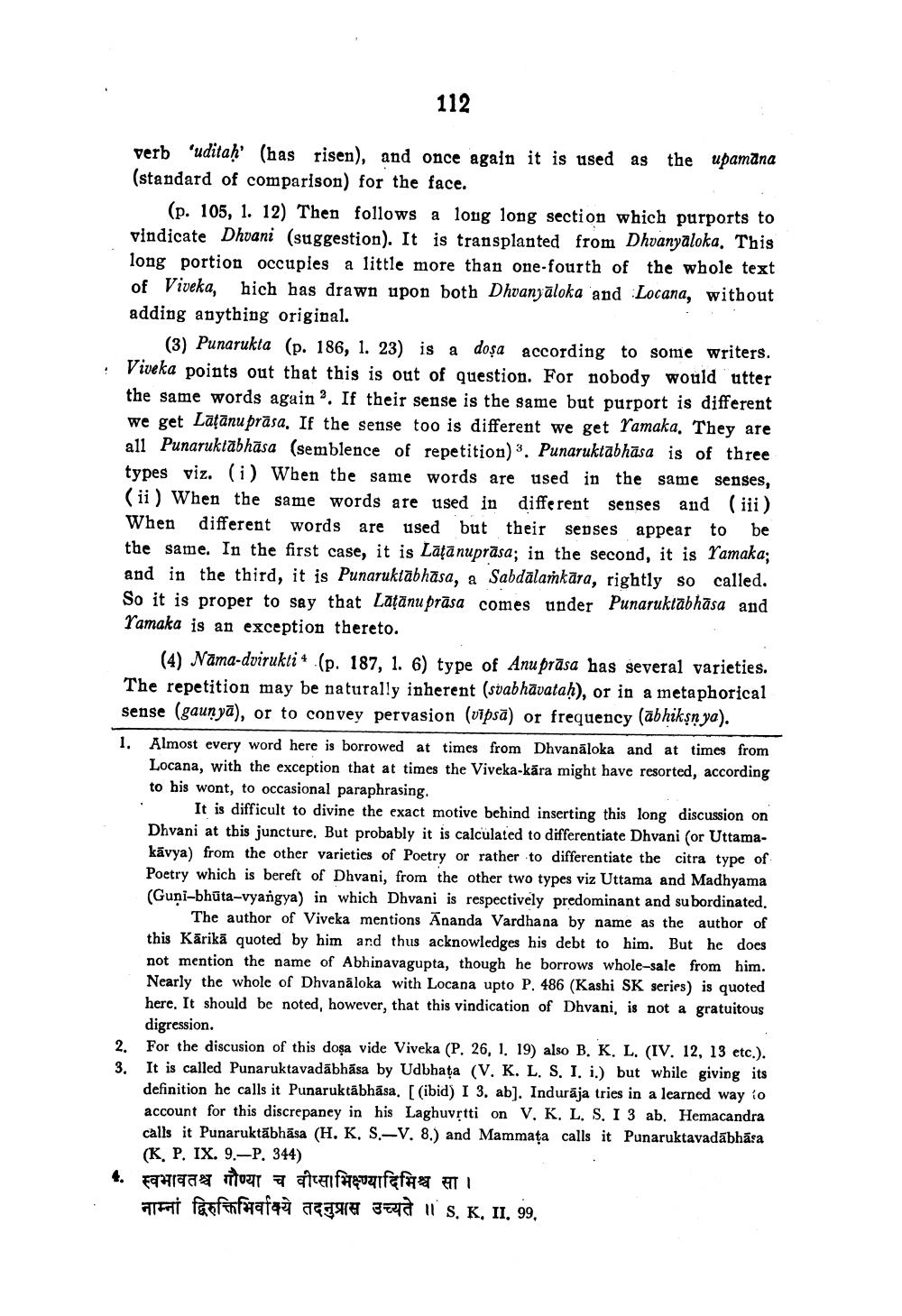________________ 112 verb 'uditah (has risen), and once again it is used as the upamana (standard of comparison) for the face. (p. 105, 1. 12) Then follows a long long section which purports to vindicate Dhvani (suggestion). It is transplanted from Dhvanyaloka. This long portion occupies a little more than one-fourth of the whole text of Viveka, hich has drawn upon both Dhvanzaloka and Locana, without adding anything original. (3) Punarukta (p. 186, 1. 23) is a dosa according to some writers. Viveka points out that this is out of question. For nobody would utter the same words again. If their sense is the same but purport is different we get Lalanu prasa. If the sense too is different we get Yamaka. They are all Punaruktabhasa (semblence of repetition)". Punaruktabhasa is of three types viz. (i) When the same words are used in the same senses, (ii) When the same words are used in different senses and (iii) When different words are used but their sepses appear to be the same. In the first case, it is Latanuprasa; in the second, it is Yamaka; and in the third, it is Punaruktabhasa, a Sabdalamkara, rightly so called. So it is proper to say that Latanu prasa comes under Punaruktabhasa and Yamaka is an exception thereto. (4) Nama-dvirukti + (p. 187, 1. 6) type of Anu prasa has several varieties. The repetition may be naturally inherent (svabhavatah), or in a metaphorical sense (gaunya), or to convey pervasion (vipsa) or frequency (abhiksnya). 1. Almost every word here is borrowed at times from Dhvanaloka and at times from Locana, with the exception that at times the Viveka-kara might have resorted, according to his wont, to occasional paraphrasing. It is difficult to divine the exact motive behind inserting this long discussion on Dhvani at this juncture. But probably it is calculated to differentiate Dhvani (or Uttamakavya) from the other varieties of Poetry or rather to differentiate the citra type of Poetry which is bereft of Dhvani, from the other two types viz Uttama and Madhyama (Guni-bhuta-vyangya) in which Dhvani is respectively predominant and subordinated. The author of Viveka mentions Ananda Vardhana by name as the author of this Karika quoted by him and thus acknowledges his debt to him. But he does not mention the name of Abhinavagupta, though he borrows whole-sale from him. Nearly the whole of Dhvanaloka with Locana upto P. 486 (Kashi SK series) is quoted here. It should be noted, however, that this vindication of Dhvani, is not a gratuitous digression. 2. For the discusion of this dosa vide Viveka (P. 26, 1. 19) also B. K. L. (IV. 12, 13 etc.). 3. It is called Punaruktavadabhasa by Udbhata (V. K. L. S. I. i.) but while giving its definition he calls it Punaruktabhasa. [(ibid) I 3. ab]. Induraja tries in a learned way lo account for this discrepancy in his Laghuvrtti on V, K, L, S, I 3 ab. Hemacandra calls it Punaruktabhasa (H. K. S.-V. 8.) and Mammata calls it Punaruktavadabhasa (K, P. IX. 9.-P. 344) स्वभावतश्च गौण्या च वीप्साभिक्ष्ण्यादिभिश्च सा। ATFI fortfarafah agama saya lis. K, II, 99,




